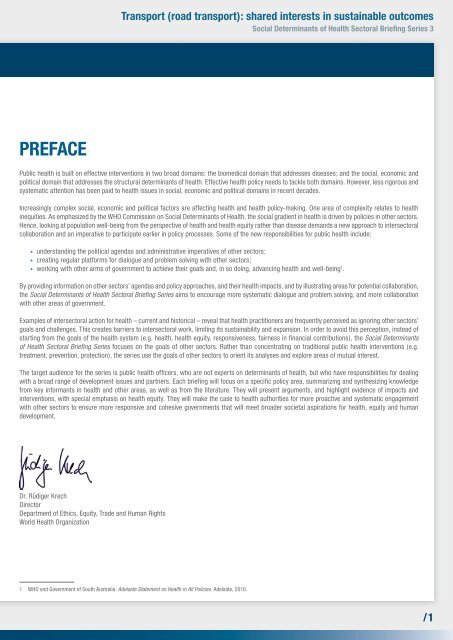Social determinantS of health Sectoral briefing SerieS 3
Social determinantS of health Sectoral briefing SerieS 3
Social determinantS of health Sectoral briefing SerieS 3
You also want an ePaper? Increase the reach of your titles
YUMPU automatically turns print PDFs into web optimized ePapers that Google loves.
preface<br />
transport (road transport): shared interests in sustainable outcomes<br />
<strong>Social</strong> determinants <strong>of</strong> <strong>health</strong> <strong>Sectoral</strong> briefi ng Series 3<br />
Public <strong>health</strong> is built on effective interventions in two broad domains: the biomedical domain that addresses diseases; and the social, economic and<br />
political domain that addresses the structural determinants <strong>of</strong> <strong>health</strong>. Effective <strong>health</strong> policy needs to tackle both domains. However, less rigorous and<br />
systematic attention has been paid to <strong>health</strong> issues in social, economic and political domains in recent decades.<br />
Increasingly complex social, economic and political factors are affecting <strong>health</strong> and <strong>health</strong> policy-making. One area <strong>of</strong> complexity relates to <strong>health</strong><br />
inequities. As emphasized by the WHO Commission on <strong>Social</strong> Determinants <strong>of</strong> Health, the social gradient in <strong>health</strong> is driven by policies in other sectors.<br />
Hence, looking at population well-being from the perspective <strong>of</strong> <strong>health</strong> and <strong>health</strong> equity rather than disease demands a new approach to intersectoral<br />
collaboration and an imperative to participate earlier in policy processes. Some <strong>of</strong> the new responsibilities for public <strong>health</strong> include:<br />
• understanding the political agendas and administrative imperatives <strong>of</strong> other sectors;<br />
• creating regular platforms for dialogue and problem solving with other sectors;<br />
• working with other arms <strong>of</strong> government to achieve their goals and, in so doing, advancing <strong>health</strong> and well-being 1 .<br />
By providing information on other sectors’ agendas and policy approaches, and their <strong>health</strong> impacts, and by illustrating areas for potential collaboration,<br />
the <strong>Social</strong> Determinants <strong>of</strong> Health <strong>Sectoral</strong> Briefi ng Series aims to encourage more systematic dialogue and problem solving, and more collaboration<br />
with other areas <strong>of</strong> government.<br />
Examples <strong>of</strong> intersectoral action for <strong>health</strong> – current and historical – reveal that <strong>health</strong> practitioners are frequently perceived as ignoring other sectors’<br />
goals and challenges. This creates barriers to intersectoral work, limiting its sustainability and expansion. In order to avoid this perception, instead <strong>of</strong><br />
starting from the goals <strong>of</strong> the <strong>health</strong> system (e.g. <strong>health</strong>, <strong>health</strong> equity, responsiveness, fairness in fi nancial contributions), the <strong>Social</strong> Determinants<br />
<strong>of</strong> Health <strong>Sectoral</strong> Briefi ng Series focuses on the goals <strong>of</strong> other sectors. Rather than concentrating on traditional public <strong>health</strong> interventions (e.g.<br />
treatment, prevention, protection), the series use the goals <strong>of</strong> other sectors to orient its analyses and explore areas <strong>of</strong> mutual interest.<br />
The target audience for the series is public <strong>health</strong> <strong>of</strong>fi cers, who are not experts on determinants <strong>of</strong> <strong>health</strong>, but who have responsibilities for dealing<br />
with a broad range <strong>of</strong> development issues and partners. Each briefi ng will focus on a specifi c policy area, summarizing and synthesizing knowledge<br />
from key informants in <strong>health</strong> and other areas, as well as from the literature. They will present arguments, and highlight evidence <strong>of</strong> impacts and<br />
interventions, with special emphasis on <strong>health</strong> equity. They will make the case to <strong>health</strong> authorities for more proactive and systematic engagement<br />
with other sectors to ensure more responsive and cohesive governments that will meet broader societal aspirations for <strong>health</strong>, equity and human<br />
development.<br />
Dr. Rüdiger Krech<br />
Director<br />
Department <strong>of</strong> Ethics, Equity, Trade and Human Rights<br />
World Health Organization<br />
1 WHO and Government <strong>of</strong> South Australia. Adelaide Statement on Health in All Policies. Adelaide, 2010.<br />
/1
















